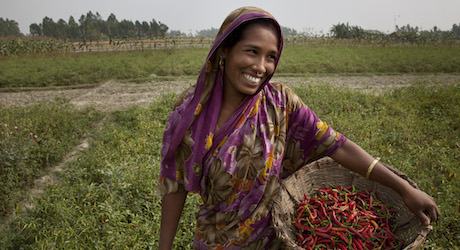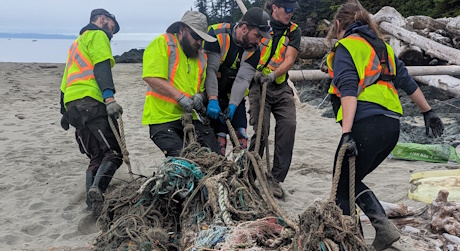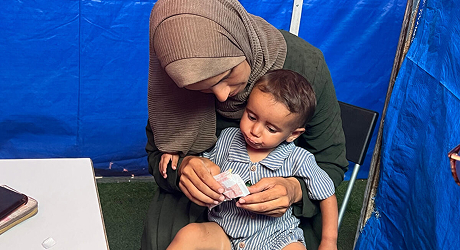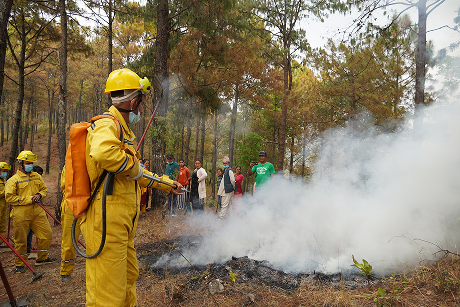Footprints Project
Since 2005, travelers like you have helped us change the world through micro-donations.

-
A total of
8679
Travelers
-
donated
$30001.31
(100% funded) -
to help reduce
Poverty
-
impacting
1200
people -
in
Bangladesh
Project Background
In Bangladesh today, poverty is deep and widespread; almost half of the population lives on less than one dollar per day. We view all our work in Bangladesh through the lens of making communities more resilient and enhancing the leadership contribution made by women.
The poverty rate in Bangladesh remains high and inequality is increasing.
As one of the most densely populated countries in the world — with a large population that relies on the land to survive — climate change is a real threat to the people of Bangladesh. As the land degrades, families are unable to produce enough food to sell for income or to feed themselves.
The impacts are far-reaching. Overcrowding deepens the persistent problems of poverty like unemployment and inadequate housing — but for many, there is no choice but to move to a densely populated area in search of a livelihood.
The issue of inequality across gender, ethnicity and regional divides also contributes to poverty. Without proper support, marginalised people are unable to assert their basic human rights, access essential services or contribute to society. Oxfam are in Bangladesh empowering people to make a change and addressing the slow and rapid onset of climate change.
Project Overview
Disaster risk reduction:
Women and men from vulnerable communities have been organised to build community resilience to disasters and climatic shocks. 286 women and men have received training on various topics including climate change and disaster risk reduction.
They applied their skills and knowledge on disaster preparedness planning in May this year, when Cyclone Roanu hit the coastal area of Bangladesh. 203 individuals, comprising men, women and young people, played a significant role in rescuing members of the community. They built awareness through door to door visits and community meetings which contributed in minimizing life loss and asset loss in the locality.
Sustainable income and employment:
The economic engagement of women has contributed to raise their voices in the community and their opinions are valued within household decision making processes. Despite social barriers, women have become connected with markets, both as purchasers of raw materials and sellers of their respective products.
Workshops with local buyers, the private sector, input sellers and service providers have helped increase production quality, quantity and price, and increase the income of beneficiaries. Additionally, workshops with financial service providers and microfinance institutes contributed to increase women’s access to capital, resulting in an increase of access to formal credit. Women who received support in capital also accessed business management counselling.
The JOYEETA award is a recognition granted by the government to successful women entrepreneurs in Bangladesh. 13 women in this program have received the JOYEETA award for their success and economic leadership in rural communities.
Women's empowerment and reducing violence against women:
Over 130,000 women (including teenagers) have been supported through informal gathering sessions and have become change agents to reduce violence against women. 972 women received training on Gender and women’s rights all over the country.
The project team organized 147 meetings to raise awareness of the impact of violence against women in families, the importance of women’s participation in decision makings and other issues. A total of 3,444 men attended. 369 women and adolescent boys and girls visited high schools, colleges and community based organizations and learnt and shared their experiences to stop violence against women. These visits strengthen networking and create social support systems to collectively support women and young people. 53,851 people joined the awareness raising campaign activities from community to national level. All these activities highlighted the issues of violence against women including harmful cultural practices and truly contributing to create an enabling environment for ensuring gender justice.
Key Project Outcomes
Direct beneficiaries:

Indirect beneficiaries:

- The program has specifically contributed to changing communities’ and local governments’ ability to anticipate possible impacts of climate change and disasters and take appropriate measures.
- Communities are now able to understand their exposure to hazards e.g. flooding, cyclones etc., and the strength of social capital like community organisations, volunteer services etc. They also identified their internal capacities and external opportunities for reducing economic shocks. This is all contributes to building community resilience and disaster risk reduction.
- Participation in the local government planning process resulted in the inclusion of marginal women, disabled people and other vulnerable groups.
- Economic empowerment has also contributed to the social empowerment of women: through participation in economic activities, women have been able to enhance their income and gain control over productive assets. This has increased their participation in household and community level decisions.

Lessons Learned
- Engagement of men in household care work, positive attitude, technical support, access to finance and proper communication with market actors creates enabling environment for women entrepreneurs, which helps them grow their business.
- Search and rescue training is very effective, which has been proved in the recent disaster, Cyclone Roanu. Training should be provided to more individuals.
- Creating networking space and strengthening communication with service providers creates new opportunities for obtaining support from them and also enhances leadership skills of women.
- Capacity building training on financial management for community and producer groups adds value in proper trade management, profit and loss calculations etc.
- Youth engagement may bring about quick and sustainable change at the community level as young people act as change agents.
- It is imperative to involve men in efforts to improve women’s socioeconomic status. It’s also critical to address underlying traditional expectations and structures that lead to their actions, as well as help men and boys to understand how they can benefit from changing their behaviour.

Jesmin Atker (30) lives in Musapur village of Sandwip upazilla (sub-district)
Case Study: Jesmin Atker
Jesmin Akter (30) lives in Musapur village of Sandwip upazilla (sub-district). Her dream was to complete her education and work for society. She dreamt of getting married after being established in society. But due to family hardship, she wasn’t able to appear for her school ending examination.
In 2007 she got married but was compelled to divorce her husband in 2010 as her husband and in-laws started mentally and physically abusing her. She returned to her parent’s house and started earning an income by stitching clothes. She became the president of Padma, a community organisation in Musapur.
She received leadership training and attended several local district events. As president, she started regular communication with the local union council. Her access and rapport with the union council helped her become a member of the union council standing committee on finance and budgeting.
Through a meeting group in her community, she contributed in stopping 5 cases of domestic violence in her area. She was also successful in stopping an incident of early marriage. Her trustworthiness and popularity in the area helped her get a job as the Union council secretary.
She is now a known face in four unions of the upazilla. She was also awarded the “Joyeeta” prize this year for her contribution as a female entrepreneur. She is now known as a ‘women leader’ in the community.
Will the project continue?
Yes.
Can I visit this project?
Yes.
Traveling soon? When you buy travel insurance with us, you can make a contribution towards a cause you care about.
Get a quote






